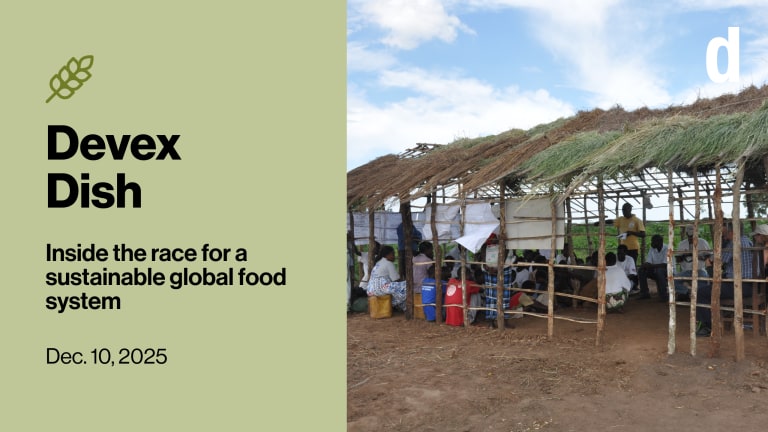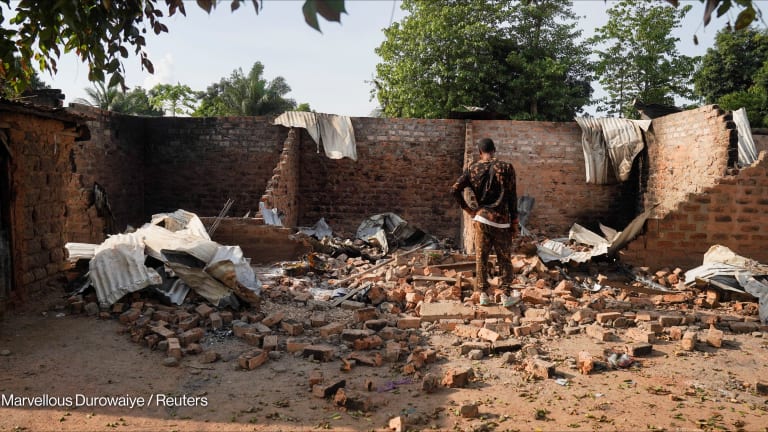Why water NGOs need to be prepared to handle conflict
With water-related conflicts on the rise, some say water NGOs need to get better at preventing and resolving tensions before they boil over.
ALICANTE, Spain — In the Sahel, farmers fight over water resources; in Iraq, water quality has brought social unrest and violent protests; and in Yemen, urban water systems are frequently attacked. With water-related conflicts on the rise, some say water NGOs need to get better at preventing and resolving tensions before they boil over. “With more people vying for less amounts of natural resources, you’re going to have more and more conflicts.” --— Charles Iceland, director of global and national water initiatives, the World Resources Institute Research shows that 17 countries currently face extremely high water stress. Conflict can occur when two or more parties hold competing claims over a water resource, its allocation, or use. Unlike something like fuel, there is no alternative to water, and with demand increasing due to population growth, more conflicts can be expected, said Aseel Naamani, programs manager in Lebanon for peacebuilding organization International Alert. If water access is jeopardized because of tensions over its source, it can have knock-on effects for health, agriculture, and more, Naamani added. “With more people vying for less amounts of natural resources, you’re going to have more and more conflicts and water insecurity around the world,” said Charles Iceland, director of global and national water initiatives at the World Resources Institute. While some organizations already have the capacity to intervene, others are still learning how to manage these situations, Iceland said. Preventing water-related conflicts Andre Shongo Diamba, an aid worker in the Democratic Republic of the Congo, said he has seen conflict between villages erupt over water spring ownership, the pollution of rivers, and fishing rights. To resolve such conflicts, Diamba said dialog is the best course of action. Water NGOs, being close to the source of the tension, might be best placed to lead those conversations. Frank van Weert, senior technical officer of water and climate at Wetlands International, said NGOs can be a “bridging actor” between groups or sometimes even play a role in interim governance. But if they are to get involved, they must know how to manage conflict. If an outsider — rather than a major water user or other key stakeholder — stepped in and wasn’t well-prepared, Iceland said they could be manipulated by one of the parties or be perceived to be taking sides. “You would be seen as ‘in the pocket’ of one side by the opposing side, and you’d lose credibility as a neutral [or] objective outside party,” he said. “I’ve seen even very knowledgeable institutions try to step in, and then be shunned by one of the parties [and] treated as persona non grata.” In some circumstances being “conflict blind” can also exacerbate social and resource inequalities and perceptions of injustice, leading to further tensions, said Jean-Philippe Debus, Catholic Relief Services’ West Africa technical adviser on WASH, who described seeing conflict emerge in Cameroon when the arrival of refugees from the Central African Republic generated concern about the limited resources available. To avoid this, CRS consults peace-building staff and community members as well as those specializing in water to gather more information, assess the situation, and create a comprehensive understanding of their needs and potential solutions. “Addressing conflict requires specialized skills and should be carried out by qualified peacebuilding personnel trained in conflict resolution,” Debus said. In Cameroon, CRS rolled out peace-building training and worked with a local partner, CODAS/Caritas-Batouri, to construct boreholes and organize water management committees that included both refugees and local residents. “When we’re talking about conflict amidst water-related challenges, we focus on … addressing the root causes of injustice, building relationships between and among stakeholder groups, establishing stable and reliable social institutions, and using sustainable technologies and development approaches,” he said. A report by the WRI recommends providing key actors with enhanced awareness of the nature and urgency of water-related threats; increasing stakeholder engagement in decision-making; and developing the capacity to intervene and detect water-related conflicts before they occur. The importance of conflict prevention, as well as resolution, was repeatedly highlighted by experts. The Water, Peace and Security Early Warning Tool — an initiative run by the Water, Peace and Security Partnership, which uses machine learning and environmental, meteorological, social, and economic data to predict water-related conflict up to year in advance — is one tool organizations can use to predict the risk of conflict in areas where they are working. That information can help them take action to defuse conflicts before they arise. But whether working to prevent conflict or stepping in once it has erupted, it’s important to analyze the local reasons behind water conflicts, Naamani said. This requires conducting a context-specific analysis while also bringing communities to the discussion table with local and national authorities. For example, in Mali — where tensions over the Inner Niger Delta had previously led to violence — International Alert engaged with the government to design projects in a conflict-sensitive way and examine environmental and social impacts, which helped to prevent further water-related conflicts, she said. Some solutions to reduce insecurity might involve using water more efficiently so that people don’t have to forego it, Iceland added. Implementing equitable laws and regulations governing water, organizing stakeholders in the region, eliminating corruption, and securing more financing can also play a role, he said. Diamba also pointed to the importance of raising awareness about good water use, training leaders to be aware of potential conflicts that could arise, and advocating effectively over water resources. Opportunities for training Several experts highlighted the importance of training water NGOs and their staff. The IHE Delft Institute for Water Education, Stockholm International Water Institute, and International Water Association all offer courses around water conflict management and water diplomacy. Courses offered by The Water, Peace and Security Partnership focus on prevention as well as the mitigation of and adaptation to water-related security risks, with a focus on increasing cooperation and peace-building efforts. For water NGOs that don’t have the capacity for training or a plan on how to deal with water conflicts, Iceland recommended reaching out to other organizations for advice.
ALICANTE, Spain — In the Sahel, farmers fight over water resources; in Iraq, water quality has brought social unrest and violent protests; and in Yemen, urban water systems are frequently attacked.
With water-related conflicts on the rise, some say water NGOs need to get better at preventing and resolving tensions before they boil over.
Research shows that 17 countries currently face extremely high water stress. Conflict can occur when two or more parties hold competing claims over a water resource, its allocation, or use. Unlike something like fuel, there is no alternative to water, and with demand increasing due to population growth, more conflicts can be expected, said Aseel Naamani, programs manager in Lebanon for peacebuilding organization International Alert.
This story is forDevex Promembers
Unlock this story now with a 15-day free trial of Devex Pro.
With a Devex Pro subscription you'll get access to deeper analysis and exclusive insights from our reporters and analysts.
Start my free trialRequest a group subscription Printing articles to share with others is a breach of our terms and conditions and copyright policy. Please use the sharing options on the left side of the article. Devex Pro members may share up to 10 articles per month using the Pro share tool ( ).
Rebecca L. Root is a freelance reporter for Devex based in Bangkok. Previously senior associate & reporter, she produced news stories, video, and podcasts as well as partnership content. She has a background in finance, travel, and global development journalism and has written for a variety of publications while living and working in Bangkok, New York, London, and Barcelona.








